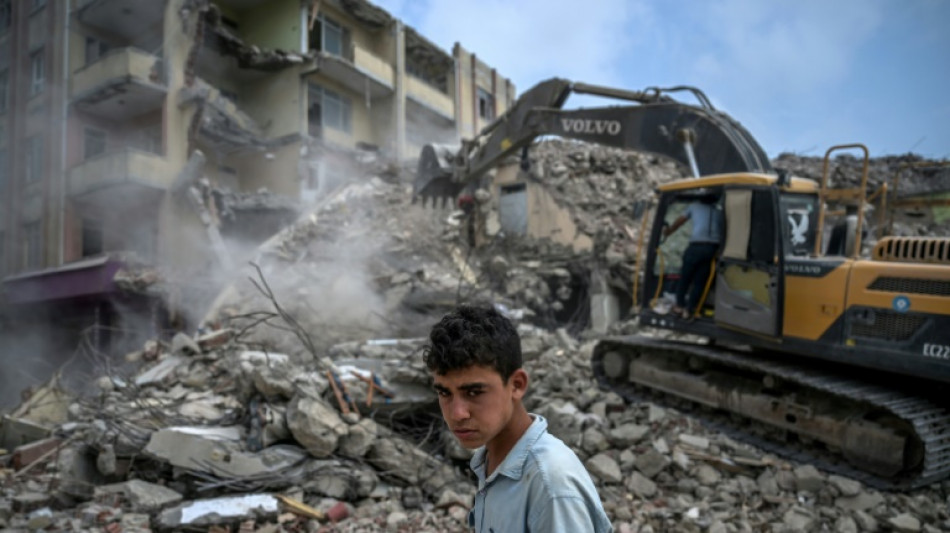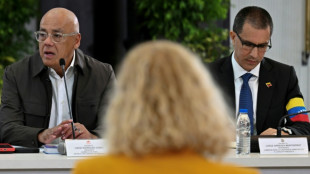
-
 UK royal finances in spotlight after Andrew's downfall
UK royal finances in spotlight after Andrew's downfall
-
Diplomatic shift and elections see Armenia battle Russian disinformation

-
 Undercover probe finds Australian pubs short-pouring beer
Undercover probe finds Australian pubs short-pouring beer
-
Epstein fallout triggers resignations, probes

-
 The banking fraud scandal rattling Brazil's elite
The banking fraud scandal rattling Brazil's elite
-
Party or politics? All eyes on Bad Bunny at Super Bowl

-
 Man City confront Anfield hoodoo as Arsenal eye Premier League crown
Man City confront Anfield hoodoo as Arsenal eye Premier League crown
-
Patriots seek Super Bowl history in Seahawks showdown

-
 Gotterup leads Phoenix Open as Scheffler struggles
Gotterup leads Phoenix Open as Scheffler struggles
-
In show of support, Canada, France open consulates in Greenland

-
 'Save the Post': Hundreds protest cuts at famed US newspaper
'Save the Post': Hundreds protest cuts at famed US newspaper
-
New Zealand deputy PM defends claims colonisation good for Maori

-
 Amazon shares plunge as AI costs climb
Amazon shares plunge as AI costs climb
-
Galthie lauds France's remarkable attacking display against Ireland

-
 Argentina govt launches account to debunk 'lies' about Milei
Argentina govt launches account to debunk 'lies' about Milei
-
Australia drug kingpin walks free after police informant scandal

-
 Dupont wants more after France sparkle and then wobble against Ireland
Dupont wants more after France sparkle and then wobble against Ireland
-
Cuba says willing to talk to US, 'without pressure'

-
 NFL names 49ers to face Rams in Aussie regular-season debut
NFL names 49ers to face Rams in Aussie regular-season debut
-
Bielle-Biarrey sparkles as rampant France beat Ireland in Six Nations

-
 Flame arrives in Milan for Winter Olympics ceremony
Flame arrives in Milan for Winter Olympics ceremony
-
Olympic big air champion Su survives scare

-
 89 kidnapped Nigerian Christians released
89 kidnapped Nigerian Christians released
-
Cuba willing to talk to US, 'without pressure'

-
 Famine spreading in Sudan's Darfur, UN-backed experts warn
Famine spreading in Sudan's Darfur, UN-backed experts warn
-
2026 Winter Olympics flame arrives in Milan

-
 Congo-Brazzaville's veteran president declares re-election run
Congo-Brazzaville's veteran president declares re-election run
-
Olympic snowboard star Chloe Kim proud to represent 'diverse' USA

-
 Iran filmmaker Panahi fears Iranians' interests will be 'sacrificed' in US talks
Iran filmmaker Panahi fears Iranians' interests will be 'sacrificed' in US talks
-
Leicester at risk of relegation after six-point deduction

-
 Deadly storm sparks floods in Spain, raises calls to postpone Portugal vote
Deadly storm sparks floods in Spain, raises calls to postpone Portugal vote
-
Trump urges new nuclear treaty after Russia agreement ends

-
 'Burned in their houses': Nigerians recount horror of massacre
'Burned in their houses': Nigerians recount horror of massacre
-
Carney scraps Canada EV sales mandate, affirms auto sector's future is electric

-
 Emotional reunions, dashed hopes as Ukraine soldiers released
Emotional reunions, dashed hopes as Ukraine soldiers released
-
Bad Bunny promises to bring Puerto Rican culture to Super Bowl

-
 Venezuela amnesty bill excludes gross rights abuses under Chavez, Maduro
Venezuela amnesty bill excludes gross rights abuses under Chavez, Maduro
-
Lower pollution during Covid boosted methane: study

-
 Doping chiefs vow to look into Olympic ski jumping 'penis injection' claims
Doping chiefs vow to look into Olympic ski jumping 'penis injection' claims
-
England's Feyi-Waboso in injury scare ahead of Six Nations opener

-
 EU defends Spain after Telegram founder criticism
EU defends Spain after Telegram founder criticism
-
Novo Nordisk vows legal action to protect Wegovy pill

-
 Swiss rivalry is fun -- until Games start, says Odermatt
Swiss rivalry is fun -- until Games start, says Odermatt
-
Canadian snowboarder McMorris eyes slopestyle after crash at Olympics

-
 Deadly storm sparks floods in Spain, disrupts Portugal vote
Deadly storm sparks floods in Spain, disrupts Portugal vote
-
Ukrainian flag bearer proud to show his country is still standing

-
 Carney scraps Canada EV sales mandate
Carney scraps Canada EV sales mandate
-
Morocco says evacuated 140,000 people due to severe weather

-
 Spurs boss Frank says Romero outburst 'dealt with internally'
Spurs boss Frank says Romero outburst 'dealt with internally'
-
Giannis suitors make deals as NBA trade deadline nears


Turkey quake survivors' latest menace -- dust
The excavator tore into the remnants of the damaged building in southeast Turkey, bringing it crashing down into a cloud of dust -- the latest menace facing survivors of the deadly February quake that ravaged the region.
Extending to the horizon, a cocoon of fine grey dust envelops the city of Samandag in the south of Hatay province, devastated by the February 6 earthquake that killed more than 55,000 people and laid waste to parts of Turkey and Syria.
"We survived the earthquake but this dust will kill us," Michel Atik, founder and president of the Samandag Environmental Protection Association, said with a sigh.
"We are going to die of respiratory diseases and lung cancer with all these hazardous materials."
Five months after the quake, the scale of cleanup and reconstruction is enormous, with the government estimating that nearly 2.6 million buildings have been destroyed.
According to the UN Environment Programme, some 210 million tonnes of rubble must be disposed of.
By comparison, some 1.8 million tonnes of rubble had to be hauled away after the September 11, 2001 attacks in New York City that brought down the World Trade Center skyscrapers.
Environmental activists and local residents worry that in the rush to clean up and rebuild, crucial safety measures are being ignored, with potentially adverse effects on the health of local residents, the environment and the economy.
- Landfills -
The landfill near Samandag is one of several that have been set up in this province bordering Syria. It lies next to the Mediterranean and the Milleyha natural bird reserve, which is natural bird reserve, which is a nesting site for endangered green sea turtles.
Another landfill, in the Antakya region, lies near a valley of olive trees at the foot of the Nur Mountains. With olive oil the primary source of income in the province, there are fears that the dump could harm the trees.
"They don't even hose it down," said Cagdas Can, 33, an environmental activist with the Reconstruct group, as he watched trucks filled with debris leave Samandag toward the huge open-air landfill that lies next to one of Turkey's longest beaches.
"There were other possible sites... But the companies that won the tenders (for clearing) chose here to save fuel," said Can.
"All they care about it recovering the iron and the metal," he said.
"Nobody wears a mask. The demolition sites are not covered or hosed down and neither are the holds of the trucks, as required by law," he said.
Can said that his environmental organisation had tried to stop the trucks by forming human chains, "but the police intervened. Eighteen people were arrested and I had my collarbone broken," he said.
The exhausted local population, faced with a myriad of problems after the quake, has not mobilised, he said, but they are as worried as the conservationists about the impact of the cleanup.
- Hidden hazards -
"The children are the first to be affected, they cough a lot, so do we. As soon as it's windy, everything is covered in dust," said Mithat Hoca, 64, who sells vegetables at a stall in central Samandag.
"We have to cover everything," said Mehmet Yazici, a 61-year-old retiree who passed by on a scooter. "We wipe the table 15 to 20 times a day. You have to do it every half hour".
Ali Kanatli, a doctor in Antakya, some 26 kilometres (16 miles) away from Samandag, has already seen cases of "conjunctivitis, allergies, asthma, bronchitis."
But above all, he worries about the long-term effects, like an increase in cancers, that the hazardous materials in the rubble and dust could cause in the region.
Turkey did not ban asbestos until 2013 and most of the buildings affected by the quake are older, he said.
"In addition to asbestos, we have lead in paint, heavy metals including mercury in electronic equipment such as televisions, household appliances", he said.
X.Habash--SF-PST




